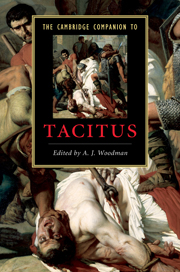Book contents
- Frontmatter
- Introduction
- Part I Contexts
- Part II Texts
- 3 The Agricola
- 4 The Germania as literary text
- 5 The faces of eloquence: the Dialogus de oratoribus
- 6 Fission and fusion: shifting Roman identities in the Histories
- 7 The Tiberian hexad
- 8 Hamlet without the prince? The Claudian Annals
- 9 ‘Is dying so very terrible?’ The Neronian Annals
- Part III Topics
- Part IV Transmission
- Chronological table
- Abbreviations and bibliography
- Index
6 - Fission and fusion: shifting Roman identities in the Histories
from Part II - Texts
Published online by Cambridge University Press: 28 March 2010
- Frontmatter
- Introduction
- Part I Contexts
- Part II Texts
- 3 The Agricola
- 4 The Germania as literary text
- 5 The faces of eloquence: the Dialogus de oratoribus
- 6 Fission and fusion: shifting Roman identities in the Histories
- 7 The Tiberian hexad
- 8 Hamlet without the prince? The Claudian Annals
- 9 ‘Is dying so very terrible?’ The Neronian Annals
- Part III Topics
- Part IV Transmission
- Chronological table
- Abbreviations and bibliography
- Index
Summary
When Pliny the Younger wrote to his friend Titinius Capito explaining his current reluctance to follow in the footsteps of his formidable uncle Pliny the Elder and write a historical work, one reason for his hesitation stands out sharply (Ep. 5.8.12): “tu tamen iam nunc cogita quae potissimum tempora aggrediamur. uetera et scripta aliis? parata inquisitio, sed onerosa collatio. intacta et noua? graues offensae, leuis gratia. / However, be considering already now what time period in particular I should tackle. Olden times which others have written about? The material is at hand, but collating it will be hard work. Recent times untouched [by others]? There is huge potential to offend, but little chance to please.” / Pliny eloquently encapsulates here the Scylla and Charybdis confronting any historian considering appropriate subject matter for his projected work. When Tacitus contemplated his first foray into the genre of history after publishing his so-called minor works, he too faced difficult choices about the chronological boundaries of his historical narrative.
- Type
- Chapter
- Information
- The Cambridge Companion to Tacitus , pp. 85 - 99Publisher: Cambridge University PressPrint publication year: 2010

